Sorted by date Results 86 - 110 of 263

WASHINGTON, D.C. - On July 29, 1958, President Dwight D. Eisenhower signed the National Aeronautics and Space Act into law, officially establishing the National Aeronautics and Space Administration (NASA). The landmark legislation marked a turning point in American science and technology, ushering in a new era of civilian-led space exploration. The Act was born out of urgency and ambition. Just months earlier, the Soviet Union had stunned the world with the launch of Sputnik 1, the first...

On August 3, 1934, a seismic shift occurred in the political landscape of Germany. Adolf Hitler, already Chancellor of the German Reich, moved swiftly to consolidate ultimate authority by merging the roles of President and Chancellor into a new position-Führer und Reichskanzler (Leader and Reich Chancellor). This marked the culmination of Hitler's rise from party agitator to unchallenged ruler, effectively dismantling the last remaining checks on his power. The Context: Death of President Hinden...
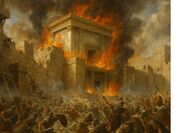
The destruction of the Second Temple in Jerusalem on August 4, 70 AD by Roman forces marked one of the most devastating and transformative events in Jewish history. It was not just the loss of a building but the collapse of an entire way of life-religiously, socially, and politically. As flames engulfed the sacred site, centuries of tradition were reduced to rubble, and the Jewish people faced a turning point that would reshape their identity for generations. Historical Background: The First Jew...
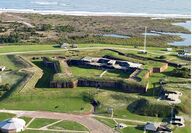
On August 5, 1864, the Union Navy launched one of its most daring and consequential assaults of the American Civil War: the Battle of Mobile Bay. Led by Rear Admiral David G. Farragut, the Union flotilla stormed through Confederate defenses guarding the entrance to Mobile Bay, Alabama, sealing off one of the last major Southern ports and delivering a strategic blow to the Confederacy's Gulf Coast operations. The battle was not merely a naval engagement-it was a calculated assault on a fortified...

On the morning of August 6, 1945, the Japanese city of Hiroshima awoke to a clear summer sky. By 8:15 a.m., that sky was torn apart by a blinding flash of light and a thunderous roar that would echo through history. The United States B-29 bomber Enola Gay had just released "Little Boy," the world's first atomic bomb used in warfare. In an instant, Hiroshima was transformed from a bustling urban center into a smoldering wasteland. Approximately 70,000 people were killed immediately, and tens of...
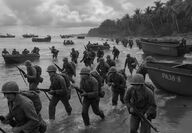
August 7, 1942 – February 9, 1943 Guadalcanal, Solomon Islands The Battle of Guadalcanal was the United States' first major offensive in the Pacific Theater of World War II. It was a campaign born of urgency and executed with grit, marking the moment when the Allies seized the strategic initiative from Imperial Japan. Over six months, American forces fought a brutal land, sea, and air campaign that would become a crucible of modern warfare. Strategic Imperatives and the Opening Assault By m...

On August 26, 55 BC, Julius Caesar stood on the shores of Gaul, gazing across the narrow waters of the English Channel toward a land that had long intrigued Roman minds but remained unconquered. That day marked the beginning of Rome's first military incursion into Britain-a bold and symbolic maneuver that would echo through centuries of imperial ambition, cultural exchange, and historical mythmaking. The Political Winds Behind the Crossing Caesar's decision to invade Britain wasn't purely...

On July 13, 2024, the quiet town of Butler, Pennsylvania became the epicenter of a seismic moment in American political history. What began as a routine campaign rally for former President Donald J. Trump ended in chaos when a gunman opened fire from a rooftop, grazing Trump's ear and killing firefighter Corey Comperatore, who heroically shielded his family. The shooter, Thomas Matthew Crooks, was swiftly neutralized by Secret Service counter-snipers. 🇺🇸 A Rally Cry Heard Across the Natio...

One of the most pivotal diplomatic moves of the 18th century took place on July 9, 1778, when King Louis XVI of France formally declared war on Great Britain, throwing the full weight of a European power behind the American colonies in their fight for independence. A Turning Point in the Revolution Though tensions between France and Britain were longstanding-fueled by previous conflicts like the Seven Years' War-the American Revolution provided France an opportunity to strike back at its rival...

Introduction The year 1921 is etched in the annals of Mongolian history as a pivotal turning point-a year that witnessed the unraveling of a centuries-old order and the forging of a modern nation. Mongolia's struggle for independence from Chinese control and the subsequent establishment of the Mongolian People's Republic unfolded against a backdrop of regional upheaval, revolutionary fervor, and the shifting sands of global power. The story of Mongolia's 1921 revolution is not only a tale of...

On June 18, 1815, the fate of Europe hung in the balance on a muddy Belgian battlefield near the village of Waterloo. After escaping exile on Elba and briefly reclaiming power during his dramatic "Hundred Days" return, Napoleon Bonaparte faced a coalition determined to end his reign once and for all. In a clash that would seal the future of the continent, Napoleon's French army was decisively defeated by the Duke of Wellington's Anglo-allied forces and Field Marshal Gebhard Leberecht von...

July 17, 1936 – Spain - General Francisco Franco launched his revolt against the Spanish government from the Canary Islands, where he was stationed at the time. This military uprising quickly spread from Spanish Morocco to mainland Spain, marking the beginning of the Spanish Civil War. Franco's rebellion was part of a broader coup by conservative military officers who opposed the leftist Popular Front government which had recently been elected. Within days, Franco emerged as the leading figure a...

July 18, 1863, during the American Civil War, the Battle of Fort Wagner was fought. The assault on Fort Wagner on Morris Island ended as a crushing victory for the Confederacy; but the role that the 54th Massachusetts Volunteer Infantry regiment played in the assault was so heralded in the northern press that the battle ultimately helped secure a Union victory in the Civil War. The 54th was the first formal African American regiment raised in the North. Most White Americans, even many who staunc...

On July 20, 1969, the world watched in awe as the Apollo 11 Lunar Module, "Eagle," descended onto the Moon's surface in a region known poetically as the Sea of Tranquility. With this moment, astronauts Neil Armstrong and Edwin "Buzz" Aldrin etched their names into history, becoming the first humans to land and walk on another celestial body. Their achievement was not only a triumph of technology, courage, and perseverance-it was a powerful symbol of mankind's insatiable desire to explore the unk...

Manassas Junction, Virginia: The First Major Battle and Confederate Triumph On July 21, 1861, the rolling fields near Manassas Junction, Virginia, bore witness to the first major land battle of the American Civil War: the First Battle of Bull Run, known to Southerners as the Battle of Manassas. This early clash would shatter illusions of a quick conflict, set the tone for the years to come, and mark a turning point in the nation's understanding of the scale and seriousness of the war about to...
On July 23, 1988, General Ne Win - Burma's de facto ruler since a 1962 military coup - announced his resignation amid mounting nationwide unrest, marking a dramatic shift in the country's rigid political landscape. His departure followed weeks of mass pro-democracy protests driven by economic collapse, authoritarian repression, and a growing demand for democratic governance. Ne Win, whose Burma Socialist Programme Party (BSPP) had dominated the country for over two decades, was infamous for isolating Burma from the international community and...

El Alamein, Egypt - On July 27, 1942, the First Battle of El Alamein concluded with Allied forces successfully halting the final Axis push into Egypt, marking a critical turning point in the North African campaign of World War II. The battle, which raged from July 1 to July 27, pitted the British Eighth Army-composed of troops from the United Kingdom, Australia, New Zealand, South Africa, and India-against the formidable German-Italian Panzer Army Africa led by Field Marshal Erwin Rommel, the...
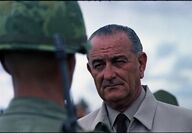
On July 28, 1965, President Lyndon B. Johnson stood before reporters in the East Room of the White House and made a declaration that would dramatically reshape the United States' involvement in the Vietnam War. He announced a significant troop surge-from 75,000 to 125,000-while also doubling monthly draft calls to meet the demands of a deepening conflict. While Johnson emphasized the U.S. commitment to halting communist aggression and offered an open door to unconditional peace talks, this...

The June 2025 Los Angeles riots have initiated constitutional questions about State vs. Federal authority. Per Article IV, Section 4 of the U.S. Constitution, it is up to the Governor or legislature of a State to request federal assistance; otherwise, the general government can enforce federal laws but generally has no authority to interfere with State affairs. Furthermore, the 1878 Posse Comitatus Act prohibits the use of the military in domestic law enforcement. A catalyst for this act was to...

June 26, 2008 the U.S. Supreme Court ruled in District of Columbia v. Heller that the Second Amendment to the United States Constitution protects an individual right. The Court also held that the District of Columbia handgun ban was unconstitutional. In the 2008 case of District of Columbia v. Heller, the U.S. Supreme Court affirmed that the Second Amendment to the Constitution protects an individual's right to possess firearms. This decision affirmed that Americans have a right of self-defense...

In the early hours of June 25, 1950, the fragile peace on the Korean Peninsula shattered as North Korean troops surged across the 38th parallel, launching a full-scale invasion of South Korea. This marked the beginning of the Korean War, a brutal conflict that would last three years, claim millions of lives, and set the tone for Cold War confrontations for decades to come. A Divided Peninsula The roots of the war lay in the aftermath of World War II, when Korea-liberated from Japanese colonial...
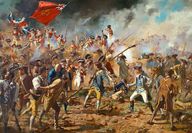
On June 17, 1775, the Battle of Bunker Hill took place in Charlestown, Massachusetts, during the Siege of Boston. Though the British ultimately won the battle, their heavy losses proved that the American colonial forces were capable of standing against the might of the British Army. Background: The Siege of Boston Following the battles of Lexington and Concord in April 1775, colonial militias surrounded British forces in Boston, preventing their movement beyond the city. British commanders,...

On June 24, 637 AD, the rolling hills near what is now Moira, County Down, bore witness to the largest and bloodiest battle in Irish history-a clash that would reshape the political landscape of early medieval Ireland. Known as the Battle of Moira or Cath Maige Rath in Irish, this monumental conflict pitted Domnall mac Áedo, the High King of Ireland, against his foster son and rival, Congal Cáech, King of Ulaid (Ulster), who was backed by Domnall Brecc, King of Dál Riata. A Kingdom Divided Ir...
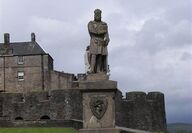
On June 23, 1314, the fields south of Stirling Castle bore witness to the opening clash of the Battle of Bannockburn, a defining moment in the First War of Scottish Independence. Led by King Robert the Bruce, the Scottish forces confronted the might of King Edward II's English army, setting the stage for a confrontation that would shape the future of Scotland. The Road to Bannockburn The battle was precipitated by a siege: Stirling Castle, a key strategic stronghold, had been under Scottish...

June 30, 1936 – Geneva, Switzerland - In one of the most powerful and prophetic speeches of the 20th century, Emperor Haile Selassie I of Ethiopia stood before the League of Nations on this day in 1936 to plead for justice and international solidarity in the face of Italy's brutal invasion of his country. His address, delivered in Geneva to a packed assembly of diplomats and journalists, was not only a desperate appeal for aid but also a searing indictment of global inaction in the face of f...